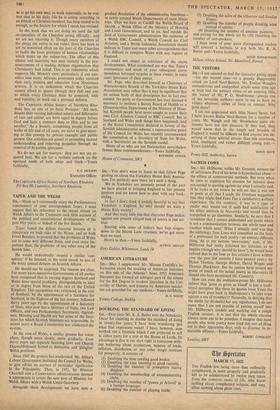SACRED COWS SIR,—Mr. Hillborne, unlike Mr. Greacen, accuses me of
unfairness. Part of his letter is hypothetical abuse— the silliest of controversial methods. But even when he rises to argument his concern for fairness does not extend to quoting against me what I actually said. If he looks at my review he will see that it was not to poets at all that I made the frivolous suggestion that they might find Peter Pan a satisfactory resthetic experience. On the contrary, it was to a type of reader who would not (I said) find satisfaction of his sillier instincts in Mavericks and would thus be compelled to go elsewhere. Similarly, he says that I 'complain that I cannot understand any poem which is not a communication between one whole man and another whole man.' What I actually said was that the anthology New Lines was assembled on the basis of a preference for such poetry—an entirely different thing. As to my narrow `movementy' taste, if Mr. Hillborne had really followed my criticism as he implies (though why should he have?), he would have noticed that in the four or five articles I have written over the past few months I have praised poetry by Dylan, Thomas, George Barker, David Wright and Thomas Blackburn. But he cannot have missed my praise of much of the actual poetry in Mavericks (I should also have mentioned Mr. Cronin's).
How can even the confusion-prone Mr; Hillborne believe that 'grass as green as blood' is just a tradi- tional metaphor like those he quotes from Yeats (he might have gone back to Shakespeare's `to take arms against a sea of troubles')? Naturally, in denying that the simile (or dissimile) has any significance, I do not mean that I am not capable of putting myself into Mr. Hillborne's sandals and working out a rough English version: it is just that the whole exercise always turns out to be pointless. I imagine that most people who write poetry have tried this sort of thing out in their apprentice days, only to discover its in- tractable silliness.—Yours faithfully,


































 Previous page
Previous page